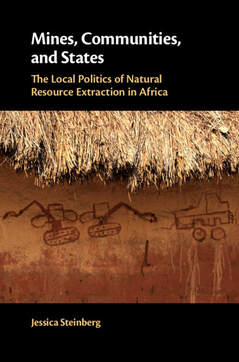Research

I am Associate Professor in the Department of International Studies at Indiana University in Bloomington, Indiana.. As a political scientist by training, I work at the intersection of comparative politics and IR, in the areas of political economy of development, and conflict studies, with a focus on sub-national outcomes. I'm interested in politics of natural resources and the environment, violent conflict, state capacity, information politics, and local cooperation and trust.
In my book, “Mines, Communities, and States: The Local Politics of Natural Resource Extraction in Africa” (Cambridge University Press, 2019), I explore why in some regions of natural resource extraction, firms provide goods and services such as schools, roads, to local communities and the environmental consequences of extraction are mitigated. However, in other regions, communities mobilize against resource extraction, leading to government regulatory or repressive intervention. I focus on these outcomes in Africa, where natural resource extraction is a particularly important source of revenue for states with otherwise limited capacity. I argue that local populations are important actors in extractive regions because they have the potential to impose political costs on the state, and economic costs on the state and the extractive firm. Governments, in turn, must assess the economic benefits of extraction and the value of political support in the region and make a calculation about how to manage trade-offs that might arise between these alternatives. This book won the International Studies Association's 2020 Harold Sprout Award for the Best Book in Environmental Politics.
Methodologies:
mixed methods, structured case comparison (qualitative), formal theory, quantitative analysis and GIS, whatever the best addresses the question I'm interested in understanding
Regional interests:
Representative Publications:
For more more information, please find my CV here.
In my book, “Mines, Communities, and States: The Local Politics of Natural Resource Extraction in Africa” (Cambridge University Press, 2019), I explore why in some regions of natural resource extraction, firms provide goods and services such as schools, roads, to local communities and the environmental consequences of extraction are mitigated. However, in other regions, communities mobilize against resource extraction, leading to government regulatory or repressive intervention. I focus on these outcomes in Africa, where natural resource extraction is a particularly important source of revenue for states with otherwise limited capacity. I argue that local populations are important actors in extractive regions because they have the potential to impose political costs on the state, and economic costs on the state and the extractive firm. Governments, in turn, must assess the economic benefits of extraction and the value of political support in the region and make a calculation about how to manage trade-offs that might arise between these alternatives. This book won the International Studies Association's 2020 Harold Sprout Award for the Best Book in Environmental Politics.
Methodologies:
mixed methods, structured case comparison (qualitative), formal theory, quantitative analysis and GIS, whatever the best addresses the question I'm interested in understanding
Regional interests:
- Africa (Democratic Republic of Congo, Republic of Congo-Brazzaville, Mozambique, Senegal, and Zambia)
- India
Representative Publications:
- Steinberg, J. and Mike Gibilisco. (2022) " Strategic Reporting: A Formal Model of Biases in Conflict Events." American Political Science Review. First View 1-17. doi:10.1017/S0003055422001162
- Steinberg, J. “Structure and Context: A Multi-level Approach to Supply Chain Governance.” Forthcoming. Annual Review of Political Science.
- Carugati, Federica, Cyanne Loyle, and Jessica Steinberg. “The Sensitive Politics of Information for Digital States” Noema. March 14, 2023.
- Steinberg J. (2019) Mines, Communities, and States: The Local Politics of Natural Resource Extraction in Africa. Cambridge University Press.
- Steinberg, J. (2018). ‘Strong’ states and strategic governance: A model of territorial variation in state presence. Journal of Theoretical Politics, 30(2), 224–245.
- Steinberg, J. (2018) Protecting the capital? On African geographies of protest escalation and repression. Political Geography, Volume 62, 12-22
- Steinberg, J. (2016). Strategic Sovereignty: A Model of Non-state Goods Provision and Resistance in Regions of Natural Resource Extraction. Journal of Conflict Resolution, 60(8), 1503–1528.
For more more information, please find my CV here.